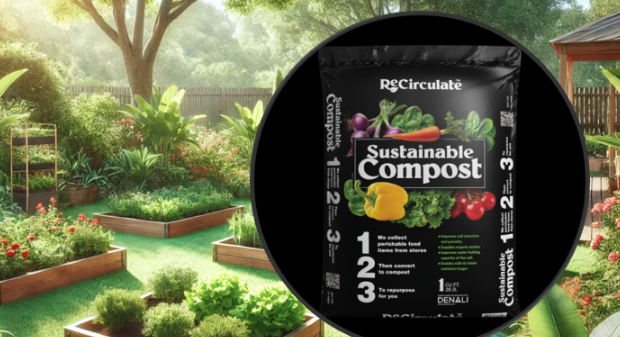Denali has just unveiled ReCirculate, compost made from unsellable food scraps. The firm claims to be green but is it really the answer to food waste, or just another way to make money off of eco-conscious consumers?
Key Takeaways
- ReCirculate aims to reduce landfill food waste by repurposing grocery discards.
- Critics argue that Denali’s approach monetizes waste rather than solving the issue.
- Real sustainability may require a shift from profit-driven recycling to actual waste reduction.
Denali’s ReCirculate compost is sold as eco-friendly and is marketed as a solution for food waste reduction. It is produced by turning the unmarketable food in supermarkets into compost, an item that makes eco-conscious shoppers keen to have sustainable gardening alternatives. This sounds wonderful, but there is now a debate over whether the project is really good for the environment. Is this actually a waste-saving effort or just another case of a company riding on the green wave?
The world is beset by food waste: tons of discarded food ends up in landfills every year. It there decays, yielding methane, a greenhouse gas 28 times more potent than carbon dioxide. The reasoning for Denali’s compost is simple: by diverting food from landfill, they’re lowering the methane that’s released into the atmosphere. But critics think that the product doesn’t get at the cause. The food waste epidemic doesn’t begin at the landfill, but rather in overproduction, underplanning and a dispersed food system.
Repurposing waste as an encashable good may appear to be the magic formula for a circular economy. But maybe things are not as straightforward. Reuse does not go directly to waste’s origin. Rather, it is at times “Band-Aid” in nature and offers a way to balance excesses, not avoid them. But what Denali makes money from is taking a scrap, a scrap that would otherwise be put in the garbage, and turning it into a green product. But is it really green, or a repurposed revenue generator in disguise?
It hasn’t always been a clear distinction between sustainability and advertising, but green products have made that very much easier. The rise of terms such as “eco-friendly” and “green” has made a consumer market for sustainability to be attractive. But when businesses start selling waste as a “green” product, experts believe, that it’s turning away from real, real-world environmental action. For instance, if truly sustainable methods were to be focused on reducing waste by working in the food supply chain rather than converting it to compost, that would focus on the need to minimize waste.

Also, there’s a little illusion of help that comes from trying to persuade customers to purchase eco-labels. In the event that consumers purchase things such as ReCirculate, they may think that they’re doing their part for the environment. But in fact, the real change might be small if these purchases do not reduce the cycle of waste production. Composting food waste, in this scenario, can remove landfill but isn’t the same as a move towards sustainability.
The solution to food waste, in the words of systemic change proponents, is prevention, not treatment. For instance, instead of using compost products to deal with waste, businesses could invest in not overproducing food, having better inventory, and re-distributing unsold food to the less fortunate. This would be more involved and less lucrative in the short term than composting waste, but could be more successful. Denali’s solution, innovative as it might be, goes only to part of the solution.
It’s hard to deny that ReCirculate does some green work. It helps to prevent methane emissions by decreasing the amount of food that goes into landfill. Methane emissions are essential to combating climate change because the gas causes global warming. But, say sustainability researchers, this could be even more so if waste was reduced more deeply at source. If overproduction and consumption aren’t addressed, then companies such as Denali are treating the symptoms rather than the cause.
Branding ReCirculate as a green product is good business for Denali, at a time when consumers care more about the environment than ever. But strictly speaking, in an environmentalistic sense, this might be a form of “greenwashing”, in which companies tout sustainability without investing in real environmental change. These are the same kinds of consumers that critics say offer consumers an eco-friendly message but fail to provide the overall sustainability promise.
Does Denali’s ReCirculate compost count for the green? Partly, maybe, but only part. The product might be a hit with eco-curious consumers but its suitability for food waste reduction at scale is not assured. In order to be a changemaker, corporations must ask themselves what they can do to actually reduce waste by transforming the system – not how to make a profit off recycling waste. In the end, sustainability just might require a reorientation – away from promoting green goods to putting into place policies and practices that support truly circular economy.
Denali’s ReCirculate will also appeal to eco-savvy consumers that like to support sustainable products. But with the product now available on supermarket shelves across the country, the larger question is, are efforts such as these bringing us in the right direction towards sustainability, or simply putting customers at ease about spending? If you are a serious eco-concerned, a bag of food waste compost might not be enough. What’s needed to make this real is to shift the focus from waste to environmentally friendly manufacturing in every industry.




